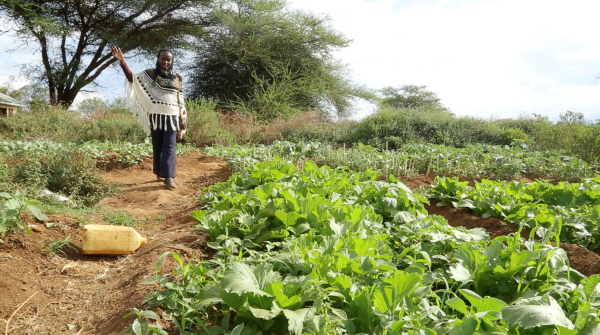In a remote Maasai village in northern Tanzania, Linda Simon, a 2014 Young African Leadership Initiative (YALI) Fellow, is working to ensure that no school child goes hungry. Linda started Education Village, a non-governmental organization (NGO) dedicated to improving the quality of education in her community in Longido District in Tanzania. One barrier to education within the community, she notes, is hunger. When children go to school on an empty stomach and have no lunch, concentration and performance are poor, school attendance is low, and the dropout rate is high.
The first school targeted by Education Village is Linda’s former school, Tinga Tinga Primary School. A kitchen garden has been set up for vegetable production for school lunches, and yields from the kitchen garden have since improved with the installation of a drip irrigation system.
Linda is one of six YALI Fellows in Tanzania that have received a technical support package from Africa Lead to strengthen strategic planning and sustainability. This support includes individualized mentoring and technical advisory services to guide and support implementation of their business and social entrepreneurship projects in agriculture and nutrition.
With the support received from Africa Lead, Education Village has set up structures that will help the organization scale up the project from supplying food for school children to helping the children’s parents create economic opportunities. An example of this is the recent launch of the ‘Brides with Skills’ project which will help young mothers develop skills that can help them earn a living while also teaching them how to improve their children’s nutrition.
According to Madawa Mhanga, Africa Lead’s technical consultant, Education Village is aiming to solve a critical element in rural communities in Tanzania.
“My role as the supporting consultant was to help Education village come up with an internal mechanism focusing on institutional setup to help them translate their vision into tangible benefits for the community. The vegetable garden in Tinga Tinga Primary School is called the “self-sufficience” project because the essence of the garden is to help [the] school meet its own food requirements without depending on donations,” says Madawa.
Linda projects that Education Village is poised to take advantage of public-private-partnerships to help finance school feeding programs.
“The bigger picture is to be able to scale up and establish more rigorous ways of funding school feeding programs […] and look for projects that are income generating,” says Linda.
